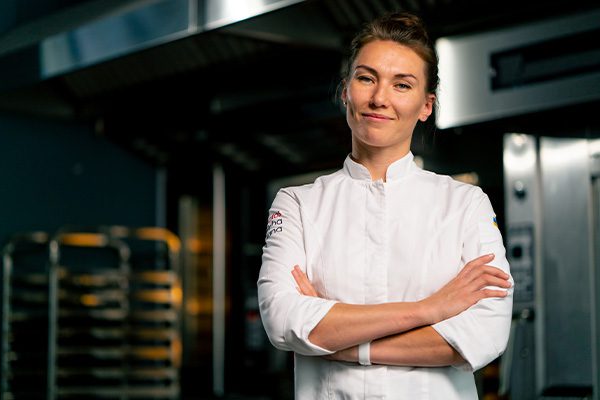Australia’s culinary scene is booming, and the chef salary Australia offers reflects both high demand and a vibrant hospitality sector. The knowledge about Australian chefs’ earnings, career opportunities, and wage factors will provide confidence for individuals beginning or working toward executive chef roles.
Overview of Chef Salary Australia in 2025
The chef salary in Australia has seen a steady rise, with the national average now ranging from $70,000 to $80,000 per year for most full-time chefs. The Australian chef’s salary surpasses the average levels of several other professions in the hospitality field, as well as the compensation rates of multiple other employment categories in Australia. Chef income levels depend on their experience level, geographic location, employer type, and qualifications. The hospitality industry continues to be stable because workforce deficiencies elevate chef pay and provide experienced culinary professionals with dependable employment. As a result, chef jobs in Australia’s salary packages are highly competitive, especially for those with specialised skills or certifications.
“The multicultural heritage and excellent living standards in Australia attract culinary professionals who want rewarding positions with competitive compensation.”
Christianson (2019) defines the career outlook for chefs at 13.9% during the period from 2021 to 2026 as the best opportunity to build or progress a chef career in Australia.
Average Chef Salary Australia by Role-based breakdown in 2025
Entry-Level Chef Salary Australia
For those just entering the kitchen, the average chef salary in Australia starts at about $61,000 per year, with junior and commis chefs typically earning between $50,000 and $62,500. The beginner positions in culinary require chefs to build basic kitchen skills and prepare food items under skilled chef mentors. Initial commercial cookery certification leads Australian chefs toward positions, yet gives them strong fundamentals for salary growth down the line.
- Commis Chef: $62,500–$67,500
- Junior Chef: $54,750–$62,930
The earning potential of junior chefs increases when they choose positions in major metropolitan areas, combined with establishments that pay well and undertake additional professional development programs. Reliability in combination with practical work experience will help chefs advance their earnings potential in the professional landscape.
Mid-Level Chef Salary Australia (Sous Chef, Chef de Partie)
The compensation of chefs rises when they gain greater experience. Mid-level chef jobs in Australia typically have salary ranges that fall between $70,000 and $80,000. High levels of responsibility for managers, trainers, and planners in the kitchen are directly linked to their increased compensation rates for sous chefs and chefs de partie.
- Sous Chef: $67,500–$75,000 (average: $71,546)
- Chef de Partie: $57,169–$67,763
The pay amount varies between cities and food establishments across Australia. Sydney and Melbourne sous chefs can receive salaries of up to $82,000, yet chefs working in regional areas earn less, although their living expenses are minimal. Speciality mid-level chefs who specialise in pastry, grill or seafood or who work in upscale restaurant,s typically earn higher salaries.
Head Chef and Executive Chef Salary Australia in 2025
Executive Chef Salary Australia
The executive chef’s salary in Australia is among the highest in the hospitality sector. Executive chefs working in their field earn between $92,000 and $115,000 per year, yet those in luxury venues or large hotels receive salaries exceeding $126,000. The executive chef manages total kitchen operations while developing menus, creating budgets, and leading their team members.
- Executive Chef: $92,000–$115,000 (top: $126,000)
Head Chef Salary Australia
Head chefs earn between 70,915 and 105,000 annually, although their roles parallel executive chefs in small eateries. Executive chefs and head chefs demonstrate similar roles, although establishments with specific size or organisational design might differentiate between the two positions.
- Head Chef: $70,915–$105,000
Senior Executive Chefs working in Australian high-end and corporate dining environments earn nearly $117,000 each year.
Latest Chef Salary Australia by City & State in 2025
Highest Paying Cities for Chefs
The location of work has a substantial influence on deciding chef pay levels. Chef salaries in Australia reach an average of $95,178 in Perth and $95,621 in Adelaide, but stay around $76,992 in Melbourne and range from $67,150 in Sydney to $67,691 in Brisbane, to $61,572 in Canberra, $61,584 in Hobart, and $65,608 in Newcastle.
| City | Average Chef Salary (AUD) |
| Perth | $95,178 |
| Adelaide | $95,621 |
| Melbourne | $76,992 |
| Sydney | $67,150 |
| Brisbane | $67,691 |
| Canberra | $61,572 |
| Hobart | $61,584 |
| Newcastle | $65,608 |
The cities of Perth and Adelaide have the highest averages for chef salaries. Still, Sydney and Melbourne follow closely because they face increased demand for culinary expertise, together with higher cost of living expenses. Chef roles in mining hubs and regional areas (especially those serving FIFO workers) may lead to pay exceeding $100,500 and potential benefits.
Also Read: Dentist Salary in Australia: Comprehensive Guide to Earnings
Regional vs. Metropolitan Chef Salaries in Australia 2025
Regional and rural areas have intensified their salary competition with metropolitan areas because hiring challenges and worker recruitment are pushing up wages. Although the chef wages are maintained at competitive levels, small towns offer desirable work-life balance opportunities because of their reduced expenses. The mining exploration areas and tourism destinations create profitable career possibilities for chefs who are ready to move or handle FIFO employment assignments.
Latest Factors Influencing Chef Jobs in Australia Salary in 2025
Experience and Specialisation
Chef salary growth in Australia greatly depends on how much experience the professionals have in their field. Chefs entering the field begin at a starting salary between $50,000 and $61,000, yet experienced professionals holding specific culinary skills can earn in excess of $100,000 annually. World-class salaries in the food industry go to pastry chefs, corporate chefs, and chefs as well as to chefs due to the specific skills needed for each role.
- Pastry Chef: $70,000+
- Personal Chef: $167,663 (top range)
- FIFO Chef: $100,500+ (with benefits)
Having advanced culinary or hospitality certifications, such as the Certificate IV in Commercial Cookery or the Diploma in Hospitality Management, will enhance wages and enable access to positions with better compensation.
Type of Employer and Establishment in Australia 2025?
Chef Salary Australia depend on the specific work setting where they operate, while the employer type also determines compensation amounts. Professional culinary establishments that include restaurants, hotels, and corporate catering services pay their chefs better than the typical meal or casual dining operations. Turning to mining camps or remote areas for FIFO work allows chefs to earn top-level salaries and additional comforts because of the difficult environment.
- Fine Dining/Luxury Hotel: Higher base salary, more benefits
- Corporate/Institutional Chef: Competitive pay, stable hours
- Catering/Personal Chef: Wide salary range, flexible arrangements
Career Pathways and Advancement for Chefs in Australia 2025
The chef career structure in Australia provides distinct promotion routes starting from commis chef level through to the executive chef position. A chef needs experience, formal qualifications, and solid leadership abilities to advance their career. Food professionals begin training at vocational institutions before working in multiple kitchen positions, leading them to advanced culinary qualifications that allow promotion to senior roles.
- Entry-Level: Commis Chef, Junior Chef
- Mid-Level: Chef de Partie, Sous Chef
- Senior: Head Chef, Executive Chef, Kitchen Manager
Professional growth as a chef becomes faster, and salary opportunities improve when an individual invests in culinary education, engages with food industry events and develops professional relationships in their field.
Job Outlook and Demand for Chefs in Australia in 2025
Australian chef job opportunities have an optimistic outlook for the upcoming years since industry projections indicate a 13.9% growth from 2021 to 2026. The hospitality industry recovery following the pandemic meets ongoing staff shortages because skilled chefs now find widespread demand in every region of Australia. Major urban areas and vacation spots actively recruit workers from Australian and overseas backgrounds to obtain employment stability and encounter various professional opportunities.
“The Australian federal government lists chefs as a critical profession that is actively seeking workers on its Skills Priority List.”
“Chefs in Australia benefit from a workplace that values fresh local cuisine due to which they can explore creative opportunities alongside professional development.”
How to Maximise Your Chef Salary in Australia 2025?
To increase the chef salary Australia offers, consider the following strategies:
| Strategy | Description | Benefits |
|---|
| Gain Formal Qualifications | Complete Certificate III/IV in Commercial Cookery or relevant culinary diploma | Higher entry-level salary & better job prospects |
| Get Skilled Migration or PR Status | Apply for PR under skilled occupations (Chef is in demand) | Access to higher-paying, long-term roles |
| Work in High-Demand Areas | Target regional or remote areas with chef shortages | Often includes bonuses, visa sponsorship, and incentives |
| Specialise in High-End Cuisine | Train in luxury, international, or niche cuisines | Higher earning potential in premium establishments |
| Accumulate Experience & Seniority | Build years of industry experience and leadership skills | Qualify for Head Chef or Executive Chef positions |
| Pursue Business Ownership | Open your own restaurant, café, or catering service | Unlimited income potential and personal branding |
| Work Overtime or Extra Shifts | Take on weekends, holidays, or double shifts | Boost weekly and annual income |
| Continuous Learning & Certifications | Take advanced culinary or management courses | Stay competitive and eligible for promotions |
- Additional certifications through further education and diplomas enhance your professional worth and career salary potential.
- You will maximise your chef salary in Australia through positions that pay higher rates in luxury hotels, fine dining establishments, and FIFO sectors.
- Moving to Perth, Adelaide, and Sydney will give you better salary opportunities.
- Focus on specialising in pastry, seafood preparation, or international dishes because this specialisation helps you distinguish yourself.
- Know the market compensation standards, then prepare to explain your value to employers when discussing job offers.
- The integration of industry trend knowledge together with a broad professional contact base will both boost your prospects for more lucrative positions and advancement.
Conclusion
The chef salary Australia is among the most attractive in the global culinary industry, with average pay ranging from $70,000 to $80,000 and executive roles exceeding $115,000. The key determinants affecting chef pay in Australia include their location, years of experience, specialisation, and sector. Australian chefs have numerous opportunities because of vibrant employment projections, heightened sector demand, and structured career progression paths. So this constitutes an ideal period to begin your chef training. If you want to increase your chef’s income in Australia, start by developing your skills, then look for positions in high-paying fields of the industry.
Ready to explore chef jobs in Australia and salary trends, or take your culinary career to the next level? The site provides access to job picks, training platforms and professional guidance that details career enhancement in Australia’s active hospitality sector.
FAQs (Frequently Asked Questions)
Q1.A chef working in Australia typically starts with annual earnings of between $50,000 and $61,000.
The pay range for beginner chefs spans from $50,000 to $61,000 annually, depending on their work location and the specific institution they serve.
Q2.A standard question remains about the total compensation of head chefs in Australia.
The typical salary for head chefs comes to $70,915, while experienced professionals earn between $105,000 and $122,460 annually.
Q3.The Australian food service industry pays higher salaries in municipalities compared to outlying areas.
The salaries paid to chefs tend to be higher in major cities, such as Perth, Adelaide, Sydney, and Melbourne. Still, regional and mining areas often give comparable or even elevated compensation due to labour shortages, with added incentives.
Q4.To pursue chef training in Australia, what qualifications must you possess?
Many starting chefs should first obtain either a Certificate IV in Commercial Cookery or a diploma in hospitality management, since these qualifications provide mandatory requirements and enhance their earning prospects.
Q5.Australian chefs need to follow the steps to get higher salaries in their profession.
Enhancing salary levels in the culinary industry requires experienced chefs to study additional qualifications while specialising in high-demand culinary areas and choosing jobs from lucrative sectors and regions.







